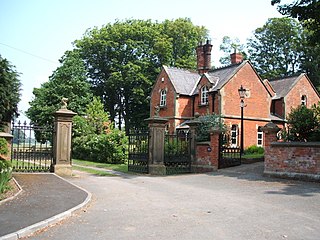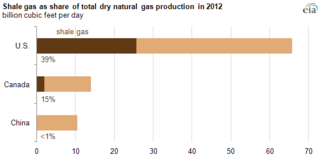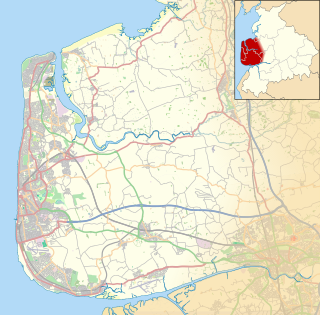
Hydraulic fracturing in the United States began in 1949. According to the Department of Energy (DOE), by 2013 at least two million oil and gas wells in the US had been hydraulically fractured, and that of new wells being drilled, up to 95% are hydraulically fractured. The output from these wells makes up 43% of the oil production and 67% of the natural gas production in the United States. Environmental safety and health concerns about hydraulic fracturing emerged in the 1980s, and are still being debated at the state and federal levels.

Singleton is a village and civil parish in Lancashire, England. It is situated on the coastal plain called the Fylde. It is located south-east of Poulton-le-Fylde, and at the 2001 census had a population of 877, increasing to 889 at the 2011 Census. The parish is sometimes referred to as two parts – Great Singleton is the larger part containing the village, and Little Singleton is a small area north of the village bordering the River Wyre.

Shale gas is natural gas that is found trapped within shale formations. Shale gas has become an increasingly important source of natural gas in the United States since the start of this century, and interest has spread to potential gas shales in the rest of the world. In 2000 shale gas provided only 1% of U.S. natural gas production; by 2010 it was over 20% and the U.S. government's Energy Information Administration predicts that by 2035, 46% of the United States' natural gas supply will come from shale gas.

Westby-with-Plumptons is a civil parish in Lancashire, England. The parish is in Fylde district and contains the hamlets of Great Plumpton, Little Plumpton, Lower Ballam, Higher Ballam, Moss Side, Peel, and Westby. At the 2011 census, the parish had a population of 1,205. Westby and Plumpton are mentioned in the Domesday Book, as "Westbi" and "Pluntun".
Gasland is a 2010 American documentary written and directed by Josh Fox. The film focuses on communities in the United States where natural gas drilling activity was a concern and, specifically, on hydraulic fracturing ("fracking"), a method of stimulating production in otherwise impermeable rock.

The inclusion of shale gas with conventional gas reserves has caused a sharp increase in estimated recoverable natural gas in Canada. Until the 1990s success of hydraulic fracturing in the Barnett Shales of north Texas, shale gas was classed as "unconventional reserves" and was considered too expensive to recover. There are a number of prospective shale gas deposits in various stages of exploration and exploitation across the country, from British Columbia to Nova Scotia.
Frack Off is a grassroots direct action campaign aimed at stopping the extraction of unconventional resources in the UK, specifically concentrating on unconventional gas extraction.

Hydraulic fracturing (fracking) has been carried out in New Zealand for over 27 years, mostly in Taranaki and also in coal seams in Waikato and Southland. Concerns have been raised about its negative effects and some local government jurisdictions have called for a moratorium on fracking but this has been rejected by the government. The environmental effects of fracking are regulated by the Resource Management Act (RMA) through the requirement for resource consents.

Hydraulic fracturing has become a contentious environmental and health issue with Tunisia and France banning the practice and a de facto moratorium in place in Quebec (Canada), and some of the states of the US.

Environmental impact of hydraulic fracturing in the United States has been an issue of public concern, and includes the potential contamination of ground and surface water, methane emissions, air pollution, migration of gases and hydraulic fracturing chemicals and radionuclides to the surface, the potential mishandling of solid waste, drill cuttings, increased seismicity and associated effects on human and ecosystem health. A number of instances with groundwater contamination have been documented, however opponents of water safety regulation claim hydraulic fracturing has never caused any drinking water contamination.
An anti-fracking movement has emerged both internationally, with involvement of international environmental organizations and nation states such as France, and locally in affected areas such as Balcombe in Sussex, Pungești in Romania and In Salah in Algeria.
Shale gas in the United Kingdom has attracted increasing attention since 2007, when onshore shale gas production was proposed. The first shale gas well in England was drilled in 1875. A number of wells have been drilled, and favourable tax treatment has been offered to shale gas producers.

The Balcombe drilling protest occurred when test drilling and possible fracking for petroleum were proposed in 2012 near Balcombe, a village in West Sussex England. Local residents protested and anti-fracking environmentalists in the UK made it a focus of attention. The drill pad is located in a wooded area known as Lower Stumble Wood.

The Marcellus is a large and prolific area of shale gas extraction from the Marcellus Formation of Devonian age in the eastern United States. The shale play encompasses 104,000 square miles and stretches across Pennsylvania and West Virginia, and into eastern Ohio and western New York. It is the largest source of natural gas in the United States, and production was still growing rapidly in 2013. The natural gas is trapped in low-permeability shale, and requires the well completion method of hydraulic fracturing to allow the gas to flow to the well bore. The surge in drilling activity in the Marcellus Shale since 2008 has generated both economic benefits and considerable controversy.

Countries using or considering to use hydraulic fracturing have implemented different regulations, including developing federal and regional legislation, and local zoning limitations. In 2011, after public pressure France became the first nation to ban hydraulic fracturing, based on the precautionary principle as well as the principal of preventive and corrective action of environmental hazards. The ban was upheld by an October 2013 ruling of the Constitutional Council. Some other countries have placed a temporary moratorium on the practice. Countries like the United Kingdom and South Africa, have lifted their bans, choosing to focus on regulation instead of outright prohibition. Germany has announced draft regulations that would allow using hydraulic fracturing for the exploitation of shale gas deposits with the exception of wetland areas.










